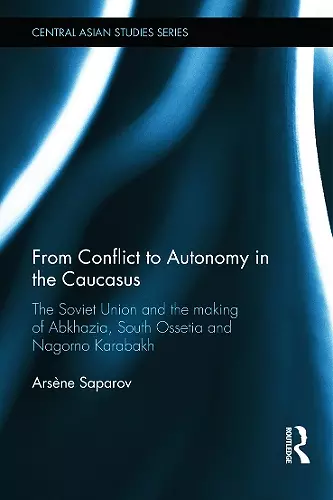From Conflict to Autonomy in the Caucasus
The Soviet Union and the Making of Abkhazia, South Ossetia and Nagorno Karabakh
Format:Hardback
Publisher:Taylor & Francis Ltd
Published:30th Jul '14
Currently unavailable, and unfortunately no date known when it will be back
This hardback is available in another edition too:
- Paperback£47.99(9781138476158)

This book is the first historical work to study the creation of ethnic autonomies in the Caucasus in the 1920s – the transitional period from Russian Empire to Soviet Union. Seventy years later these ethnic autonomies were to become the loci of violent ethno-political conflicts which have consistently been blamed on the policies of the Bolsheviks and Stalin. According to this view, the Soviet leadership deliberately set up ethnic autonomies within the republics, thereby giving Moscow unprecedented leverage against each republic.
From Conflict to Autonomy in the Caucasus questions this assumption by examining three case studies: Abkhazia, South Ossetia and Nagorno Karabakh are placed within the larger socio-political context of transformations taking place in this borderland region during the nineteenth and twentieth centuries. It examines demographic, social and economic consequences of the Russian colonization and resulting replacement of traditional societies and identities with modern ones. Based on original Russian language sources and archival materials, the book brings together two periods that are usually studied separately – the period of the Russian Civil War 1917–20 and the early Soviet period – in order to understand the roots of the Bolshevik decision-making policy when granting autonomies. It argues that rather than being the product of blatant political manipulation this was an attempt at conflict resolution. The institution of political autonomy, however, became a powerful tool for national mobilization during the Soviet era.
Contributing both to the general understanding of the early Soviet nationality policy and to our understanding of the conflicts that have engulfed the Caucasus region since the 1990s, this book will be of interest to scholars of Central Asian studies, Russian/Soviet history, ethnic conflict, security studies and International Relations.
Saparov's concentrated study expands understating of Soviet nationality policy, and demonstrates how the peoples of the South Caucasus navigated it. - M. Chakars, Saint Joseph's University
Overall, in terms of aims and analyses, Saparov’s book has the potential to be an outstanding work, dealing with the very complex subject that is boundary making in Abkhazia, South Ossetia and Karabakh. This book is a useful source to all researchers and students who are interested in ethnic conflict, nation building and conflict resolution in the former Soviet Union. - OHANNES GEUKJIAN, American University of Beirut, Beirut, Lebanon
ISBN: 9780415658027
Dimensions: unknown
Weight: 453g
200 pages